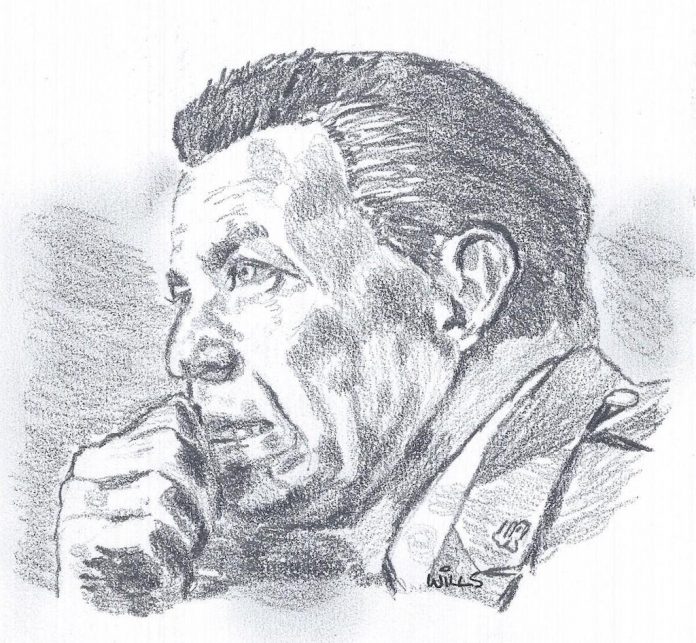Richard Condon’s book The Manchurian Candidate was published in 1959 and quickly became a best-seller. It was described by The New Yorker as “a wild and exhilarating satire”, and demonstrated Condon’s blackly cynical humour and his baroque writing style. The underlying theme of the book was that a major foreign power, via its nefarious machinations, attempts to manipulate the election of an American president, with the ultimate aim of bringing its influence to bear on America. The planned president-in-waiting, Senator John Iselin, seems to “forsake silence awake and asleep … bawling, braying, blaspheming … talking, always, always, never stopping talking”. Sixty years down the line, all this has an uncannily contemporary resonance.
The book’s central character, Raymond Shaw, is hypnotically programmed to kill on command while serving in Korea in 1952. Arguably one of the great tragic figures in American literature, Raymond is handsome, intelligent, completely unlikeable and destined to enjoy only two brief periods of happiness in his life.
Eminent movie director John Frankenheimer thought that The Manchurian Candidate was one of the best books he had ever read, and he recruited Frank Sinatra, Laurence Harvey, Janet Leigh and Angela Lansbury to turn the book into a film, which was released in 1962, with Sinatra also involved in producing. Appropriate soundtrack music was crucial, in order to underline the stark drama and the black-and-white photography. Frankenheimer felt that he knew the right man.
David Amram was an unusual and versatile musician, with feet in both classical and jazz camps. A composer of orchestral and chamber works, he also played French horn and piano, and in the mid-1950s led a quartet with tenor saxist George Barrow. Amram played as well with, among others, Charles Mingus and Oscar Pettiford, and worked with writer Jack Kerouac.
John Frankenheimer had heard some of Amram’s music for theatre productions, and this led to him being hired to write the score for Frankenheimer’s television production of a version of Turn Of The Screw, starring Ingrid Bergman. Knowing that he could write in both jazz and Latin idioms, Frankenheimer next hired Amram to score his 1962 film focusing on New York street gangs, The Young Savages, starring Burt Lancaster. Amram was an automatic choice to write for The Manchurian Candidate.
For the recording, Amram used both a studio orchestra and a large jazz group, a sort of mini-big band, including Paul Horn and Harold Land
In early 1962, Amram travelled from New York to Hollywood, where he worked intensively for a month on the score. For the recording, he used both a studio orchestra and a large jazz group, a sort of mini-big band, comprising Carmell Jones and Joe Gordon (trumpets), Dick Leith and Lou Blackburn (trombones), Paul Horn (alto sax and flute), Harold Land (tenor sax), and Jack Nimitz (baritone sax). Amram himself played piano and French horn, and it’s possible that the rhythm section comprised George Morrow on bass and Leon Petties on drums. The latter two, with Land, had worked with Amram on the music for The Young Savages, and Amram knew Land from the time that he’d written an arrangement for the Max Roach-Clifford Brown quintet in 1955. The band was completed by Latin percussion. Via this recording, Amram was able to open the door into the Hollywood recording studios for many of the musicians involved.
The orchestral music on the soundtrack reminds me in places of Charles Ives, Aaron Copland and Anton Webern although, in an interview, Amram didn’t recognize those influences. The music is sombre and reflective, in keeping with the film’s story. The Main Title contains a haunting trumpet theme, and eerie harpsichord that underlies Raymond Shaw’s solitaire games sounds like it’s a direct influence on Frank Zappa’s Uncle Meat.
…the complete soundtrack was released on CD in 1997 by Premier Recordings, so it’s possible to hear Amram’s jazz writing for the film in its entirety
Only snippets of the jazz score are heard in the film, in scenes in the soldiers’ canteen in Korea and at a party. However, the complete soundtrack was released on CD in 1997 by Premier Recordings, so it’s possible to hear Amram’s jazz writing for the film in its entirety. On six tracks, the band exhibits an earthy, bluesy sound, reminiscent of Mingus or Oliver Nelson. Harold Land is the main soloist, showcasing his fluent, sinuous technique, and David Amram features his slightly Monkish piano. On the track Home Again 1952 he improvises two funky choruses on French horn, and there are other solos by trumpeters Jones and Gordon, altoist Paul Horn and trombonist Dick Leith. Dare To Dream is a slow, romantic, reflective piece of orchestral jazz featuring Paul Horn on alto sax and flute and Amram on piano. The band contains an interesting mixture of West Coast hard boppers, and Harold Land and Joe Gordon are re-acquainted after their 1960 teaming with Thelonious Monk at San Francisco’s Blackhawk.
After The Manchurian Candidate, David Amram composed only one other movie score, in 1969 for The Arrangement, directed by Elia Kazan and starring Kirk Douglas and Faye Dunaway, but he has continued to compose, perform and conduct to great acclaim. His Triple Concerto, recorded in 1973 and featuring his jazz quintet with Pepper Adams and Jerry Dodgion, is highly recommended. Now in his 89th year, he remains very active.
The Manchurian Candidate was nominated for two Oscars, but was withdrawn from distribution in 1964 following the assassination of John F. Kennedy. It was re-released in 1987 and began to finally receive the widespread acclaim that it deserved. A remake, starring Denzel Washington and with music by Rachel Portman, was released in 2004, but, good though it was, the 1962 version remains the classic. And it’s still, sadly, relevant today.
Geoff Wills is the author of Zappa and Jazz: Did it really smell funny, Frank? (Matador, 2015)
















